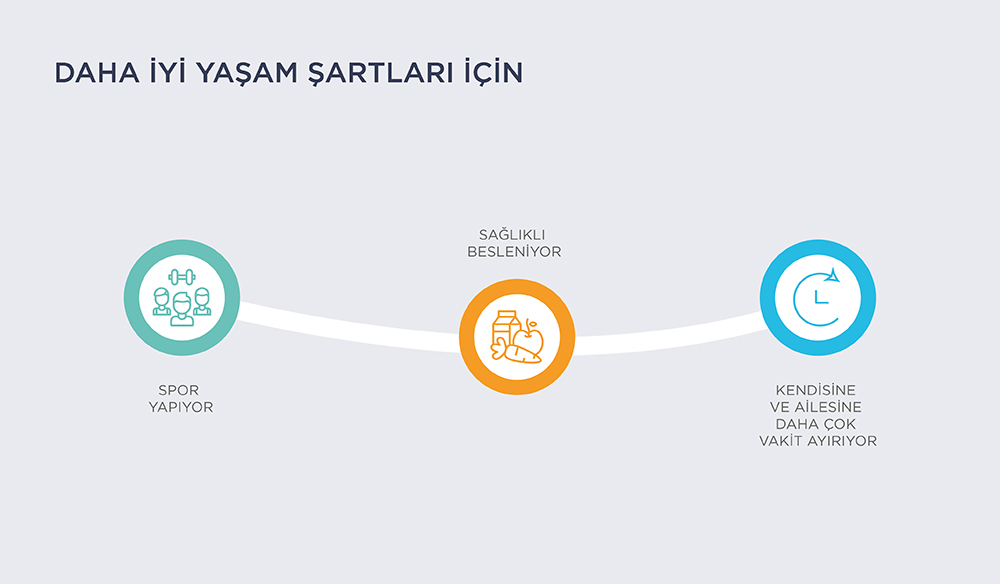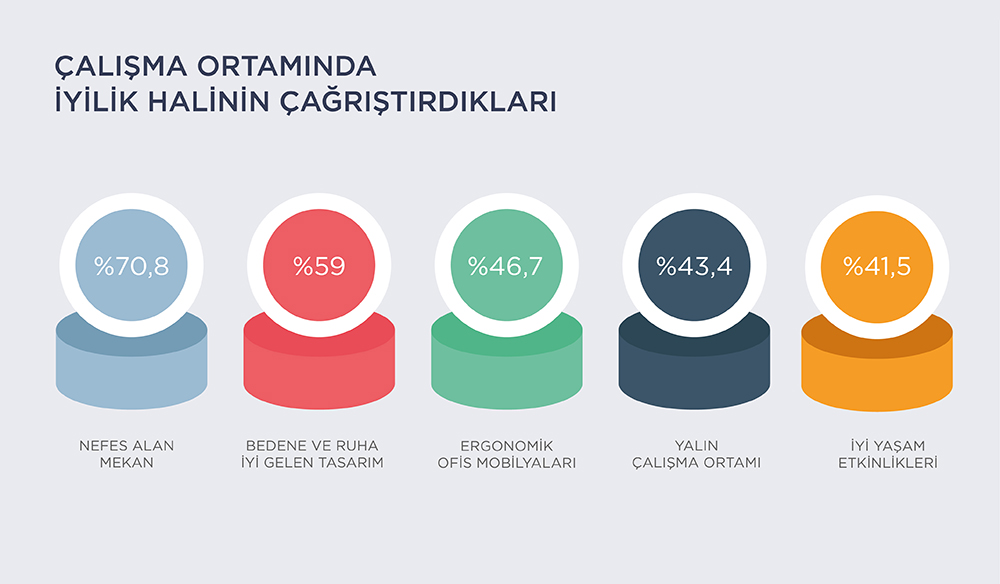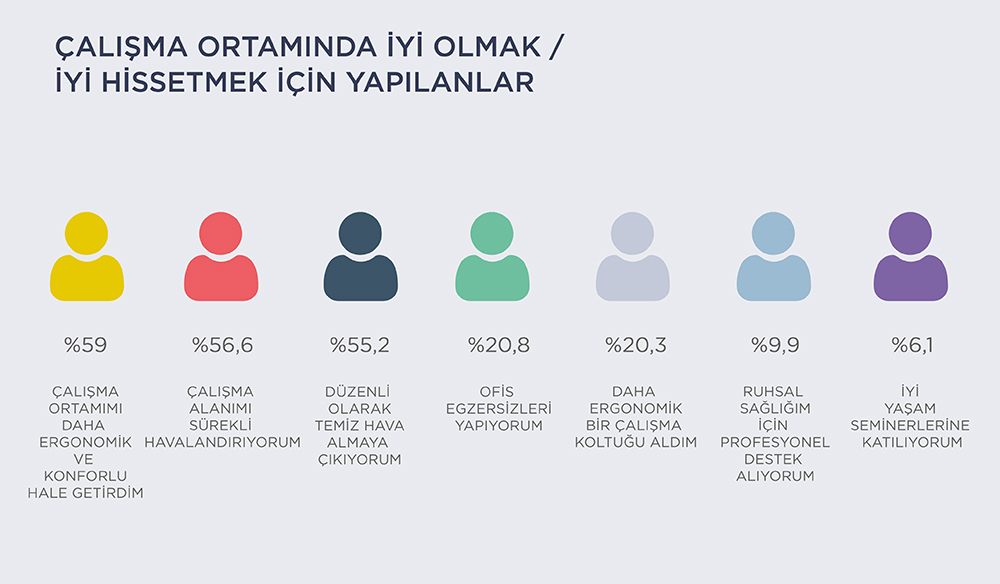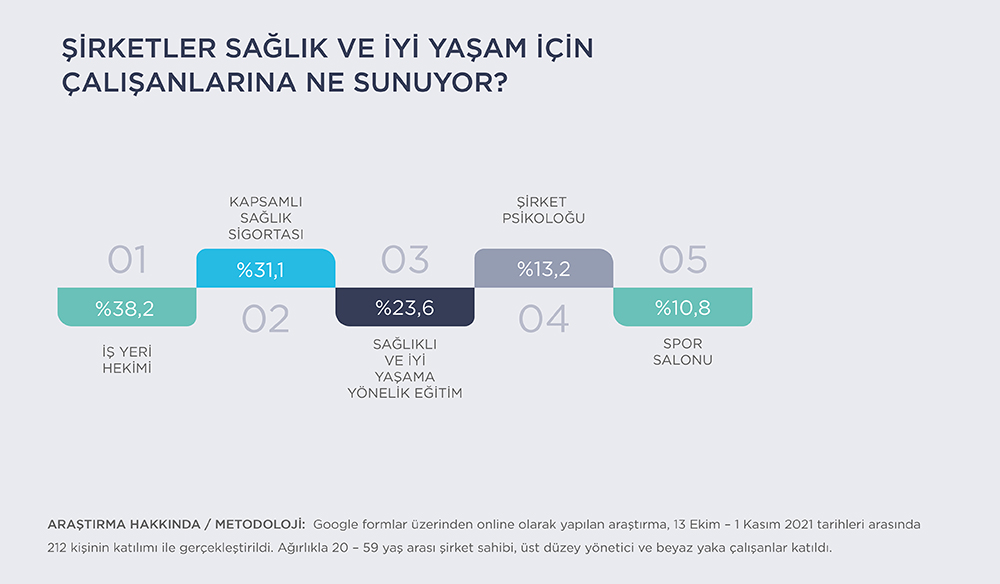Well-being is determinative in the work environment
Well-being is determinative in the work environment
The pandemic conditions of the past two years, with restrictions and remote working, have significantly challenged everyone in their daily lives and work environments. We have all re-acknowledged the importance of 'well-being'. The expectation for well-being, already a topic of discussion for some time, has become an essential element, transforming into a growing economy.
At Zivella, in our second study to observe the effects of the pandemic on work models and habits, we also asked participants about their views on well-being.

Well-being through exercise
Participants stated that they made efforts to improve their quality of life by engaging in sports, eating healthily, and dedicating more time to themselves and their families. Especially during the period when we had to stay home, exercising was more important than ever. Particularly due to the necessity of remote working and being seated continuously, physical activity became critical both for our musculoskeletal health and to feel better. Making exercise a lifestyle will be the greatest favor one can do for themselves.
The state of well-being in the work environment
For many years, work environments were not given as much importance as they are today. Simple, ordinary, not very ergonomic, and even boring work environments were considered normal, especially for Generation X and its predecessors. However, significant changes occurred with the entry of Generation Y and Z into the workforce, as expectations radically shifted. Comfort, convenience, and ergonomics in the work environments, where employees spend most of their day, have become the most important criteria. The responses of our survey participants about well-being in the workplace confirm this: breathable spaces (70.8%), designs good for the body and soul (59%), ergonomic office furniture (46.7%), minimalist work environment (43.4%), and well-being activities (41.5%).


Employees want to feel good in home-offices too
As we have frequently discussed and as our research results show, the hybrid work model will become the new normal in the business world. Therefore, home-offices will inevitably become a standard work environment. Ensuring that employees feel as comfortable in their home-offices as they do in company offices is crucial. For this purpose, we asked our survey participants what they primarily do to feel good/thrive in their work environment. We received responses such as "I made my workspace more ergonomic and comfortable" (59%), "I regularly ventilate my work area" (56.6%), "I take regular breaks to get fresh air" (55.2%), "I do office exercises" (20.8%), "I bought a more ergonomic work chair" (20.3%), "I seek professional support for my mental health" (9.9%), and "I participate in well-being seminars" (6.1%). This shows us that everyone tries different ways to feel good in their work environment.
Companies support well-being
Of course, it's not only essential for individuals to create a healthy work environment and well-being conditions for themselves but also for companies to support their employees in this regard. This is especially a priority expectation among Generation Y and Z workers. Just as everyone has different methods to feel good, the opportunities companies need to offer their employees for this purpose also vary. Among the initiatives that our survey participants' employers took for their health and well-being were an occupational physician (38.2%), comprehensive health insurance (31.1%), training/seminars related to health and well-being (23.6%), company psychologist (13.2%), and a gym (10.8%).

We have analyzed the results of our second study, which focused on 'Work Life and Well-being' this year and observed the impacts of the pandemic on work models and habits, in three separate blog posts. The need for socialization, the hybrid work model, and the state of well-being were the main pillars of our research this year. We will see together what has changed in our next study.
Latest Articles
-
How to Design an Efficient Office
-
Office Furniture Use in the Tourism Sector
-
Furniture in Co-working Spaces is Simple, Colorful and Modern
-
New Generation Offices for Gen Y and Z
-
Office Furniture Use in the Education Sector
-
We Will Be Back to Office Despite Everything
-
Resimercial Design in Modern Workplaces
-
Ergonomics = Comfort + Ease + Efficiency
-
A Few Tips for Home Offices
-
Offices Meeting the Expectations of Generations Y and Z
-
Shape of Tomorrow
